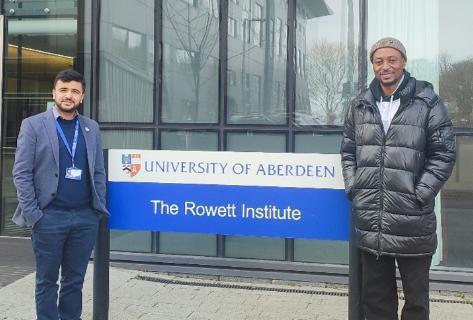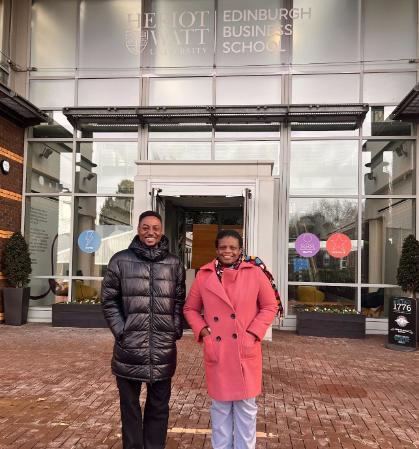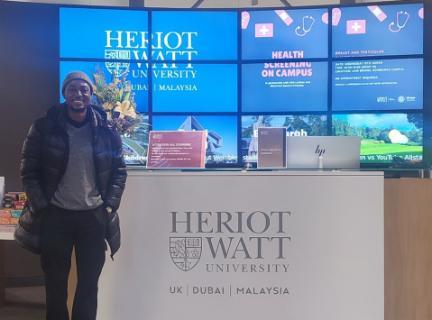Bridging Worlds: My SCAF Travel Mentorship Experience in Scotland
Published: 10 October 2025
Ifeoluwa Abulude reflects on his time spent with senior professionals as part of the SCAF Travel Mentorship Bursary
Written by Ifeoluwa Abulude, doctoral student at Justus-Liebig University, Germany
Thanks to the generous support of the Scottish Alliance for Food (SCAF) Mentorship Travel Bursary, I had the privilege of spending two rich and career-shaping days in Scotland, meeting with senior professionals whose work spans the intersections of academia, policy, and industry in the agrifood and sustainability sectors.
As an early-career researcher, this experience was not just about networking, it was a journey into the real-world applications of research, a deep dive into the science-policy-industry interface, and a chance to reflect on the different career trajectories available in this space.
Day 1: Science Meets Policy - Meeting Dr Santosh Gaihre, Institute of Applied Health Sciences, University of Aberdeen
My first visit took me to the scenic city of Aberdeen, where I had the opportunity to sit down with Dr Santosh Gaihre, a respected researcher with strong experience at the intersection of science and policy. This meeting set the tone for the entire mentorship journey: thought-provoking, grounded in real-world challenges, and full of practical insights.

Key Insights:
- Policy relevance starts with language. Dr Gaihre emphasised the importance of tailoring research outputs to different audiences. For policymakers, the message must be simple, actionable, and timely.
- Stakeholder assessment is vital. To have impact, you must first understand who needs to know and how they prefer to receive information. This includes policymakers, think tanks, academics, and industry actors.
- Multidisciplinarity isn’t optional, it’s essential. Addressing global food system challenges requires breaking down silos between agriculture, public health, environmental science, economics, and beyond.
We also discussed the different research roles in academia - Research Assistant, Research Associate, Research Fellow, and Postdoctoral Researcher - and how they differ, particularly in the UK. Understanding these nuances is essential for anyone navigating the academic job market here.
"You don’t have to have UK-specific experience to work in the UK, you just have to frame your story to show how your previous work is relevant.” Dr Gaihre
We reviewed my CV and discussed how to approach job applications strategically. He stressed the importance of meeting all essential criteria and tailoring each application clearly and concisely. It’s not about being a perfect candidate, it’s about being the right fit for that role.
Research Presentation & Feedback
I also had the chance to present my current research to members of Dr Gaihre’s group. Their feedback encouraged me to further develop the stakeholder engagement aspects of my work, not only as a strategy for inclusiveness but to bridge science and policy more effectively.
Later that day, I visited The Rowett Institute, a key hub for nutrition and health research. I met with a doctoral researcher, toured the facilities, and got a first-hand look at how advanced research infrastructure in the UK supports both academic and applied work.
We ended the day with lunch at the University of Aberdeen’s cafeteria, a chance to reflect, share stories, and build a connection that I hope will lead to future collaboration.
***
Day 2: Innovation in Action – Meeting Dr Ifeyinwa Kanu, Heriot-Watt University, Edinburgh
My second visit took me to Edinburgh, where I met with Dr Ifeyinwa Kanu, scientist and CEO of Intellidigest - a pioneering company working at the intersection of technology, sustainability, and food systems.

From the moment we met, Dr Kanu’s energy and authenticity were contagious. She shared her own academic and entrepreneurial journey, illustrating how you don’t have to choose between research, policy, and industry - sometimes, the most rewarding path is to walk across all three.
“Explore every possibility. Sometimes, let fate decide your journey - just be prepared and open-minded.” – Dr Kanu
Observing Real-World Leadership
I had the privilege of observing her daily work, moderating meetings, communicating with clients, mentoring students, and negotiating partnerships. This was an invaluable crash course in UK workplace culture, especially in hybrid and virtual settings.
I saw the importance of:
- Strong communication and negotiation skills
- Clear time management and stakeholder coordination
- Flexibility and confidence in leading diverse teams
Understanding UK Agrifood Research Needs
Dr Kanu also helped me understand the evolving landscape of agrifood research in the UK and Scotland. From regenerative agriculture to data-driven supply chain innovation, the opportunities are immense but require a systems-thinking mindset and cross-disciplinary skills.
She emphasised that:
- A PhD is a great foundation, but success lies in how you apply your knowledge.
- Every skill, whether qualitative, quantitative, social, or technical, can contribute to solving today’s food system challenges.
- Primary production and research with farmers and producers are a growing area that values practical, on-the-ground collaboration.
We closed the meeting with another CV and application review. Dr Kanu advised me to focus on contextualising my experience for each application, making sure my contributions are clear, practical, and aligned with the needs of each organisation or role.
Reflections and Lessons for early career professionals
This experience left me with more than just new contacts, it gave me perspective, clarity, and direction. Here are a few lessons I believe every early-career researcher should take to heart:
- There’s no single “right” path. Your career might cross sectors or shift directions, and that’s okay. What matters is that you stay open, strategic, and passionate.
- Engage stakeholders early. Research should not live in isolation. Stakeholder feedback and engagement can elevate your research from academic to impactful.
- Tailor everything. Whether it's a policy brief or a job application, make sure your message resonates with the intended audience. Generic applications won’t stand out.
- Network with purpose. Don’t wait for people to find you. Seek out mentors, ask questions, present your work, and build bridges across institutions and sectors.
- Tell your story. In CVs, cover letters, and interviews, the ability to narrate your journey, challenges, successes, and goals, is what sets you apart.

Moving Forward
This travel mentorship has been one of the most meaningful moments in my professional journey so far. I return to my research reinvigorated with a clearer sense of direction, new networks, and a deeper understanding of the pathways ahead.
I’m grateful to SCAF for making this opportunity possible and would encourage any ECR interested in food systems, sustainability, or climate action to take full advantage of such opportunities.
First published: 10 October 2025
<< Blog

